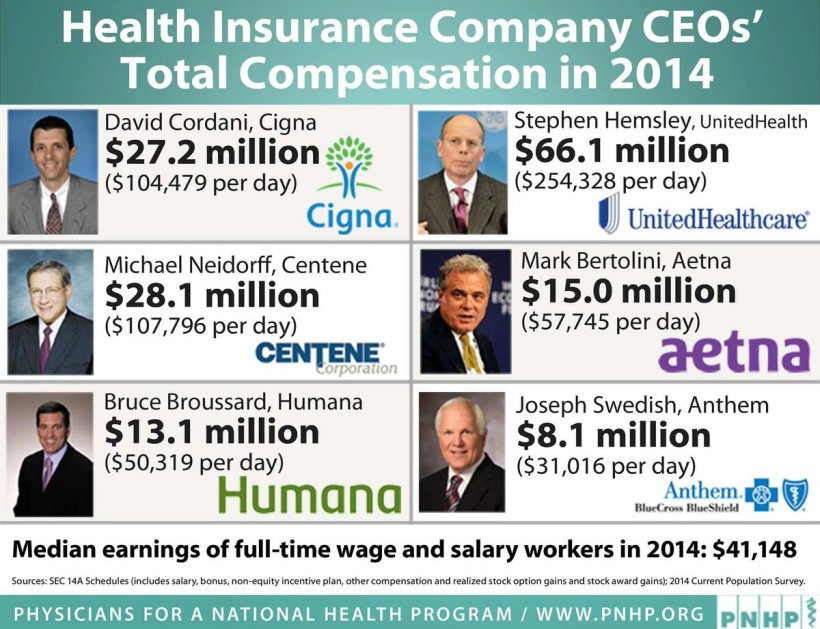In my opinion, there are 4 new major problems to the GOP health care plan.
1. The added provisions to cut Essential Health Benefits (Explanation Article)
In an attempt to make the insurance marketplace fairer and more viable, the law required insurance plans sold in the individual market, the fully insured small-group market, and through Medicaid expansion to cover a list of 10 “essential health benefits.” The list included some pretty basic medical care — like pregnancy and maternity care, mental health and addiction treatment, and lab tests.
Republican Congress members have been consistent about their desire to get rid of this part of the law. It has driven the cost of premiums up, and, they argue, limited Americans’ freedom of choice.
But you probably haven’t heard much about the “EHBs,” as they’re called among health wonks. That’s because the assumption has been that killing the provision wouldn’t be possible under the budget reconciliation procedure the GOP is using to attempt to rush their unpopular American Health Care Act through Congress.
Now, it seems, that might be wrong. In a push to win more support from the party, the latest GOP plan to repeal and replace the Affordable Care Act would get rid of the law’s EHB requirement for the individual and small-group markets. (The previous draft of the American Health Care Act already did away with the EHB requirement for Medicaid expansion enrollees.)
Instead, as Nicholas Bagley explains over at the Incidental Economist, they’ve tacked on an amendment that tells each state to define what they believe counts as an essential benefit within the state. “If a state hasn’t defined the essential health benefits, it seems that no one in the state is eligible for tax credits,” he added.
The essential health benefits cover some pretty basic health care
Before we get into the politics and public health impact of the provision, let’s understand what the EHBs cover. They are about as basic as they sound. Here’s the full list, from Healthcare.gov:
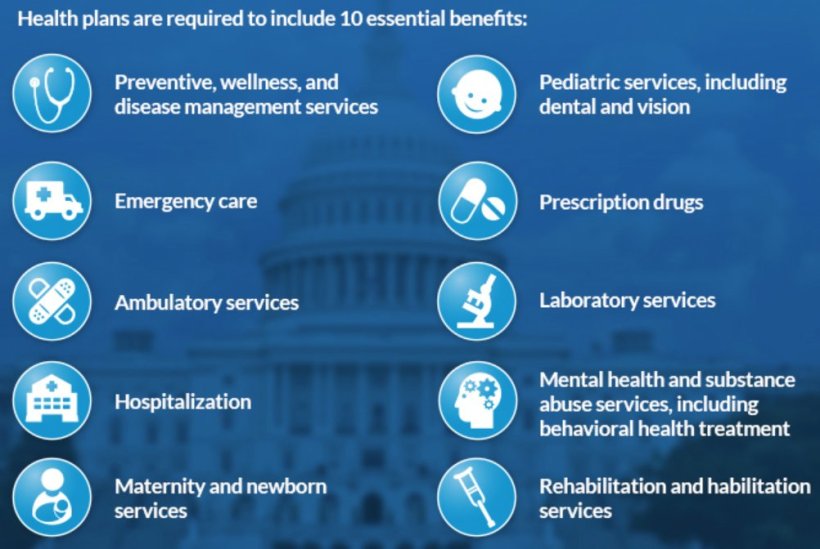
Things like dental and vision care for adults aren’t on here, and the law only requires plans to cover one drug in a therapeutic class. But the list is pretty comprehensive when you think about what people get on large-group employer-sponsored insurance.
Politically, this Obamacare provision has been pretty unpalatable to those on the right. Because insurers were guaranteeing coverage for more services, the essential health benefits drove the average cost of premiums up.
They also created a sense of solidarity — that everyone should share in the cost of health care. But Republicans have opposed the idea that the government should dictate that people buy coverage they don’t want and may not need. (Remember that old question about why men should have to pay for maternity care.) They’ve advocated that everybody should be able to choose “the plan that’s right for them.” And from this view, the essential health benefits seem like an assault on that freedom of choice.
The Rub is
“Without these requirements, you are looking at an individual market where the only policies available are extremely skimpy or expensive,” said Matthew Fiedler, a fellow at Brookings who served as chief economist of the Council of Economic Advisers, where he oversaw work on the Affordable Care Act. In the past, insurers had strong incentives to design plans in ways that were unattractive to people with predictable health needs or sick people. And getting rid of the essential health benefits, Fiedler said, “would give them a powerful tool to avoid people that expect to need care.”
Within two or three years, Blumberg expects more comprehensive coverage plans to dry up. Since insurers can’t deny coverage outright, and many will be tempted to go down to more limited policies that attract healthy people, insurers offering comprehensive policies would likely attract more sick expensive patients, which would create a selection problem and make the plans unsustainable.
Getting rid of EHBs would also make the promise of covering people with preexisting conditions meaningless. If a cancer patient or person with diabetes can get coverage but the cost of their chemotherapy or insulin isn’t covered, that coverage isn’t meaningful anymore, Blumberg said.
Getting rid of coverage would mean these health services are out of reach for many people again. This would happen at a time when we are seeing the death rate edge up for large swaths of the American population.
There also would be little economic benefit. While the move may bring the average cost of premiums down, as the LA Times’ Michael Hiltzik explains, it would
“drive costs for people who need those services sky-high and transfer much of the cost to other public programs. The net gain for society is almost invisible.”
Republicans want Americans to choose “the plan that’s right for them.” What they are proposing, though, doesn’t sound like freedom. It sounds more like a lot of people will lose their coverage or have more limited health care options in front of them. But maybe that’s the point.
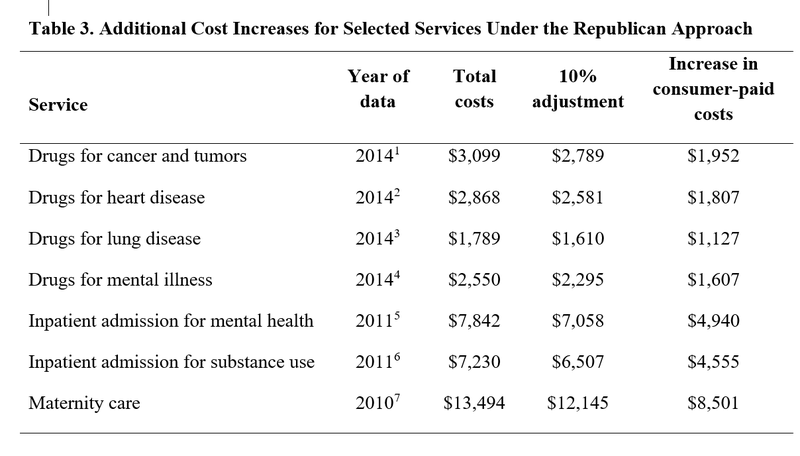
From a public health perspective, the prospect of thinning out EHBs is frightening. For example, the US already has some of the worst maternal health outcomes of all the countries in the developed world. We are also facing an opioid crisis, and suicide rates have been rising along with drug prices.
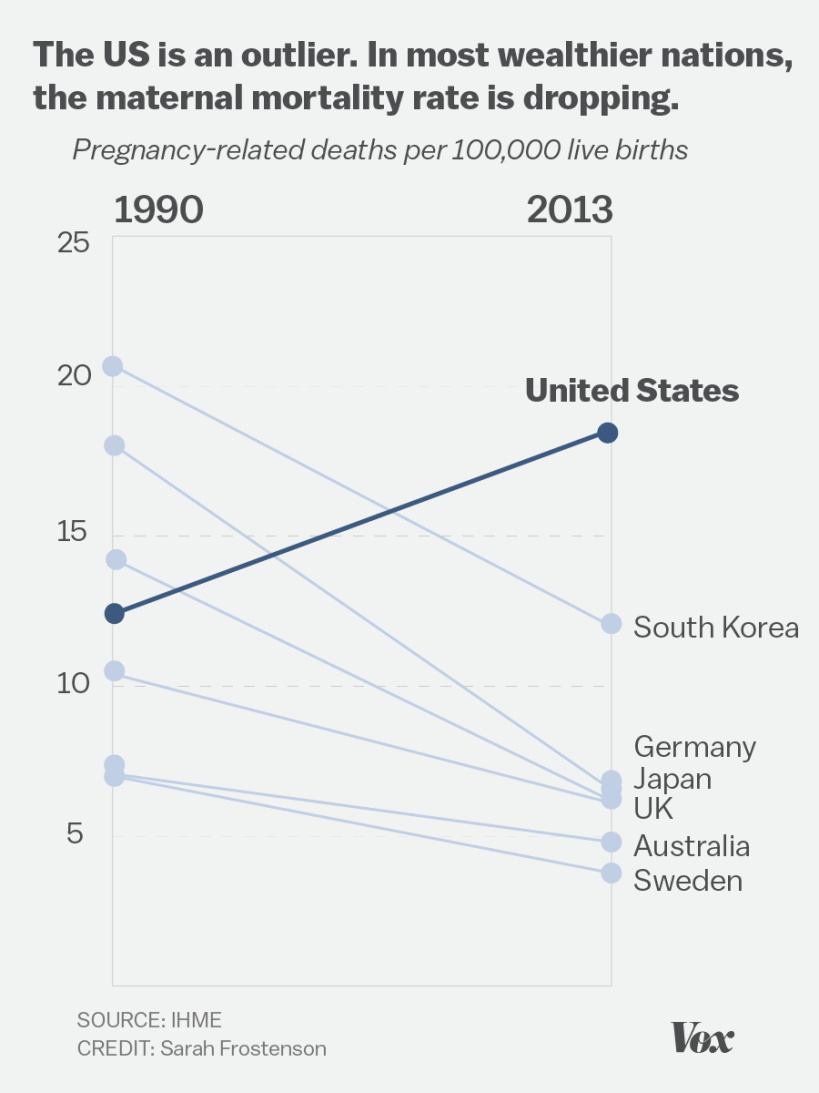
I asked Sen. Roberts if he supports scrapping Essential Health Benefits. “I wouldn’t want to lose my mammograms,” he snarked. @AliceOllstein
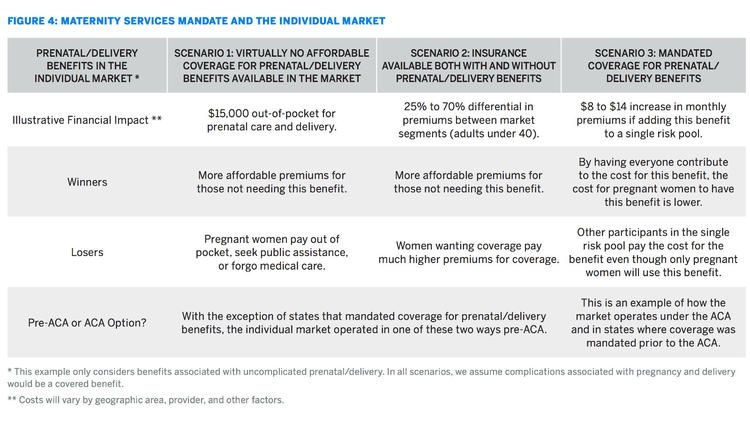
This is outrageous: Not a single woman or minority in the room as @Mike_Pence and @HouseGOP “freedom caucus” propose removing maternity coverage in #Trumpcare.
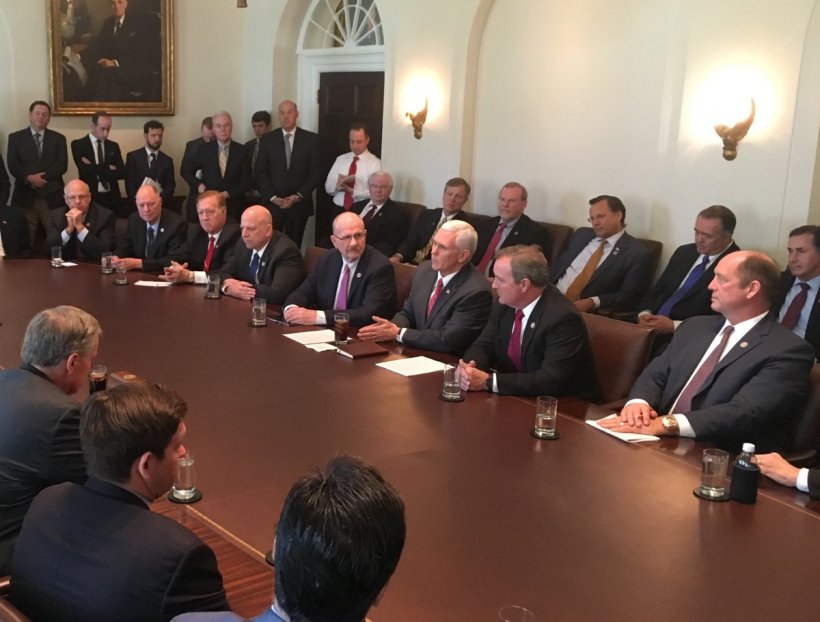
So to recap- in the name of more “choice” the GOP will make it so insurance no longer has to cover- Outpatient care, emergency care, hospitalization, pregnancy, maternity, and newborn care, mental health and addiction services, prescription drugs, rehab, lab services, preventative care, chronic disease management, and pediatric services.
So what kind of insurance is this? oh but you can bet it will still cover Viagra for these old white pricks!
But forget things like Mental Health help
Insurers could sell a wide variety of policies covering only certain benefits – the policies with fewer benefits would be cheaper. This sounds good in theory, but has a number of problems. Here are just a few.
- You may buy coverage with a $500,000 lifetime cap, but then get a disease where you need $1 million worth of care.
- By stripping out pregnancy coverage, it will be difficult to get policies that cover pregnancy at affordable prices.
- The opioid epidemic is overwhelming and treatment can be expensive. Policies to cover this problem will be tough to find.
- You may miss policy details that items such as ambulance service are not covered. If you have an emergency, you’ll receive many bills not covered by your insurance.
2. The Second Problem with the revision- It will cost more and give us less.
Recent revisions to the Republican health care bill means it would cost more, and still leave 24 million fewer people insured by 2026, new estimates from the Congressional Budget Office show.
The legislation to repeal major portions of Obamacare would reduce federal deficits by $150 billion over 10 years, according to the revised estimates. The original bill would have lowered the deficits by $337 billion. Much of the added costs stem from letting taxpayers deduct more of their medical expenses and repealing a slew of Obamacare taxes — include two levied on higher-income Americans — a year earlier. Funding for the additional tax credits — which will be crafted by the Senate — would come by allowing taxpayers to deduct medical expenses that exceed 5.8% of their income, according to a House staffer. The change would give the Senate $90 billion over 10 years to work with, the CBO found.The original GOP bill set that threshold at 7.5%. Under Obamacare, taxpayers could only deduct medical costs greater than 10% of their income. (link)
An average family making more than $200,000 a year would gain $5,640 while a family making less than $10,000 a year would lose $1,420 if Congress passes the health care plan proposed by House Republicans, according to a new analysis.
More than 70 percent of the tax cuts, however, would go to families with incomes above $200,000 a year, and more than 46 percent would go to those making more than $1 million a year.
The Republican plan eliminates taxes Obamacare imposed mostly on the rich, including taxes on investment income and wages above $200,000. (Cuts to other Obamacare taxes, including ones on medical devices, prescription drugs, and indoor tanning, benefit the population more broadly.)
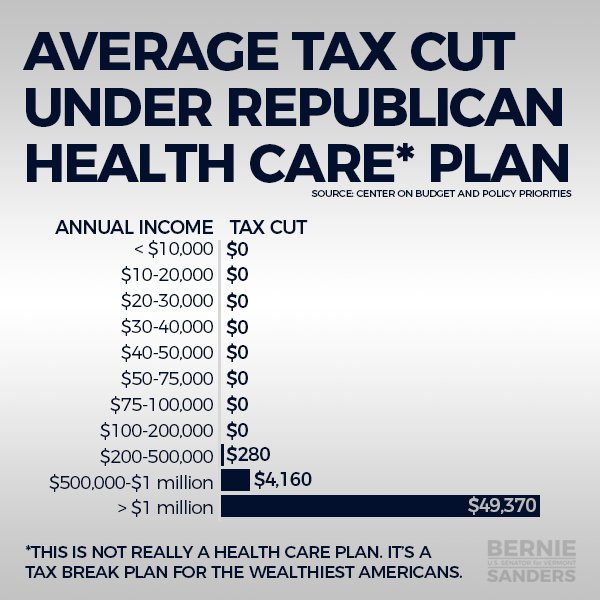
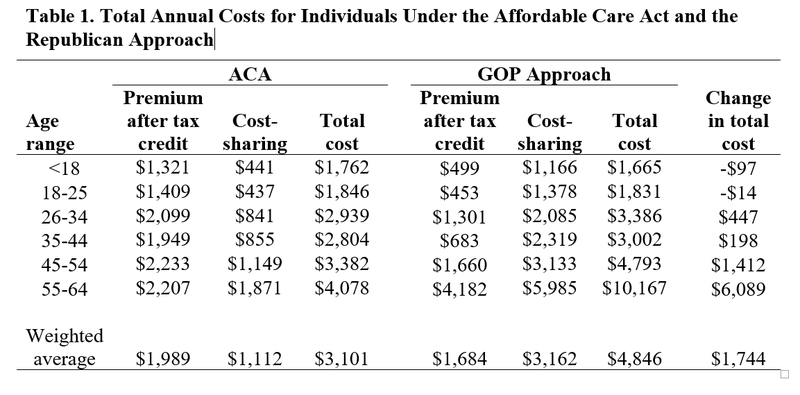
3. This will actually hurt small businesses and individuals and just benefit corporations and the rich (against what the GOP has been saying which is the ACA hurts small business)
One positive of the Affordable Care Act is that all policies are congruent in their essential benefits. When the law passed, clients in my financial planning firm who were tied to jobs they hated because of health insurance were finally able to quit that miserable part of their life. They began independent consulting jobs, started small companies, or worked part time for kinder employers without the need for employer-based coverage. This is freedom!
Small business is the backbone of America. Providing better health insurance opportunities only through large employers will significantly hamper small business development and growth. This is counter to what the Freedom Caucus desires for our country. I understand their desire to cut the costs of policies and I hope they understand this unintended consequence of removing congruent essential benefits.
There are other ways to provide essential benefits. People forget that primary care is not insurable – everyone needs it and insurance can be cost effective only if it covers high dollar care or rare disease. Pregnancy, mental health issues, common chronic diseases and preventive care affect all of us in some form or fashion. The most cost effective way to pay for this is to provide it directly. We can do this at a fraction of the cost taxpayers pay today through expanding well-funded community health centers and using direct primary care.
4. This will also Hurt Rural America the most- the very same people who voted for the GOP and Trump because the believed “Obamacare” was hurting them.
By no longer adjusting premium tax credits based on the local price of health insurance, the AHCA would dramatically decrease the premium tax credits in rural (and other) states with high health care costs.
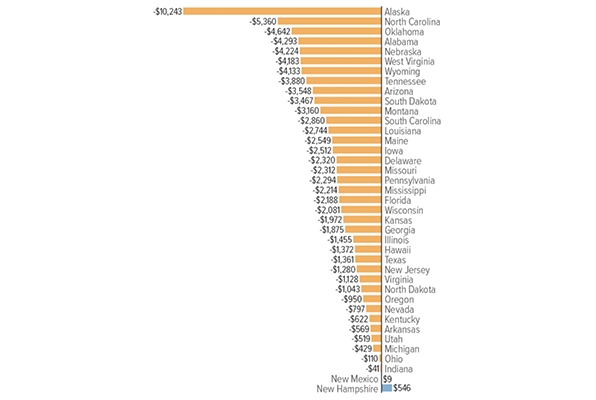
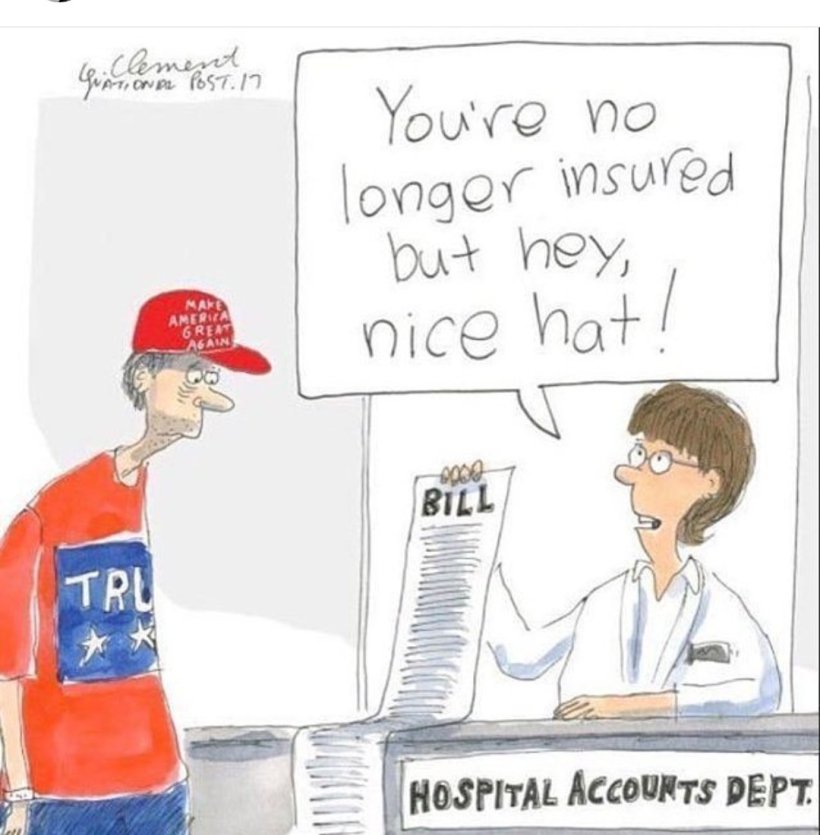
So why are they doing this?
